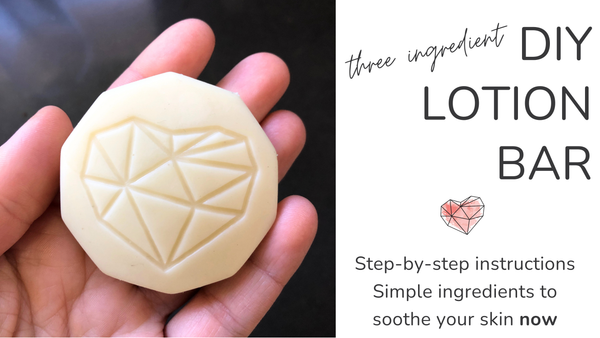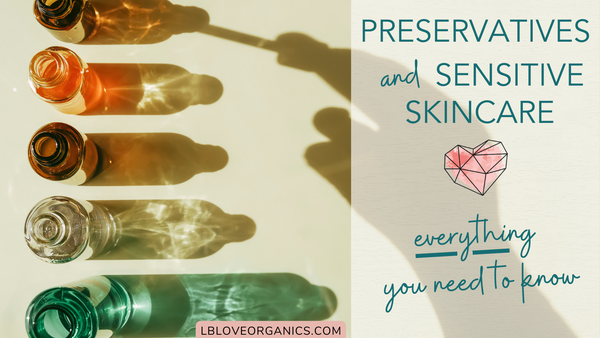Are Preservatives (like Parabens) Bad for Sensitive Skin?

Preservatives:
What are they?
Why do so many products say "paraben free?"
Should I be worried?
What does this mean for my sensitive skin?
HELP.
Preservatives (especially parabens) have become such a hot topic over the last decade. The rampant greenwashing we see in mega-company marketing such as Herbal Essences, Method, Dove, and more make it difficult to know what ingredients are and are not okay for those of us with sensitive skin.
Without drilling down too deep into the chemistry (because I am not a chemist, and likely you are not either)...Let’s review these 3 topics:
1. What are preservatives and what is their purpose
2. Common preservatives in skincare and personal care products
3. Which preservatives to avoid if you have sensitive skin
What is a Preservative?
In plain language, preservatives inhibit (prevent) the growth of microbes: bacteria, mold, and fungus in a product or food.
NOTE: This is a good thing!
Preservatives are an important part of water-based skin care, even for people with sensitive skin.
Why?
Because if your skincare has water in it (which most do - go grab your favorite lotion and you will find “aqua" or “water" listed as the first ingredient), you want preservatives.
Really?
Yes really.
Just like many foods in your refrigerator will spoil if left out, your skincare will spoil without an inhibitor to prevent mold, bacteria, or fungus from growing.
A preservative's purpose is to keep any water-based product from growing microbes, which are harmful and potentially dangerous to a person’s health.
Unfortunately, many preservatives can cause dermatitis and skin irritation. As a person with skin sensitivities, the key is to figure out which preservative your skin will tolerate best.
(Feeling lost? Want a simple guide explaining which ingredients to avoid and which to look for? Drop your email below and have it delivered to your inbox right now!👇)
Common Skincare Preservatives
So now that we know preservatives are important and necessary in water-based products, which preservatives are typically in skincare and personal care?
Two very common types of preservatives in skincare are:
1. Parabens
2. Phenoxyethanol
Paraben Preservatives
The Paraben family of preservatives are:
- methylparaben
- ethylparaben
- propylparaben
- butylparaben
Parabens are commonly used (alone or in combination) because of their low toxicity, well-tested safety profile, and inexpensive cost. Skin reactions to parabens are rare and typically do not cause allergic reactions on healthy/unbroken skin, especially compared to other preservatives, according to the most recent study by the North American Contact Dermatitis group. [Source]
👉However, if your skin is already broken/irritated (ie- you have a rash or itchy patch of skin), a paraben is more likely to cause a worse reaction and then can lead to the development of a skin allergy. This occurrence is sometimes called the “Paraben Paradox” by dermatologists.
So, it might be better to avoid parabens if you are prone to eczema, psoriasis flare-ups, or often have compromised or broken skin.
Phenoxyethanol
Another common preservative that is gaining popularity is phenoxyethanol. Beauty brands looking to remove parabens from their formulas will often use phenoxyethanol instead. It is a broad-spectrum anti-microbial, meaning it prevents a lot of yuckies from growing in water-based skincare.
Phenoxyethanol typically does not cause reactions, and very rarely causes skin irritation for people with reactive or highly-sensitive skin.
Overall, phenoxyethanol has shown to be a mild preservative in sensitive skincare products and is a good one to look for on ingredient lists. [Source]
Preservatives to AVOID
Some preservatives can be very harsh, and are diabolical to sensitive skin.
What preservatives should be avoided?
Two categories of potentially harmful preservatives are:
1. Isothiazolinone Preservatives
2. Formaldehyde-Releasing Preservatives
Let's take a closer look at both of these.
Isothiazolinone Preservatives
The Isothiazolinone (brand named Kathon) family of preservatives are:
- MCI (methylchloroisothiazolinone)
- MI (methylisothiazolinone)
- Isothiazolinone mix
These preservatives are effective at controlling microbes, but VERY harsh on the skin. Studies have shown Isothiazolinone MI/MCI preservatives cause skin irritations and reactions in 8-11% of users, often on the hands and face. Plus, in the last two decades there have been an increasing number of sensitivities and allergic reactions to this family of preservatives, likely due to increased usage in cosmetics and skincare products. [Source, Source]
Yikes! Sensitive skin friends, beware of Isothiazolinone preservatives.
Formaldehyde-Releasing Preservatives
The Formaldehyde-releasing family of preservatives are:
- Quarternium-15
- Imidazolidinyl urea/diazolidinyl urea
- Bronopol
- Dimethyloldimethyl (DMDM) hydantoin
Formaldehyde is a cheap and effective ingredient to prevent microbes from growing. BUT, it is highly allergenic and has shown to have sensitizing properties that are no bueno for sensitive skin!
These 4 formaldehyde-releasing preservatives are well-documented as allergens, even for people without skin sensitivities. And the more often skin comes into contact with these preservatives, the more likely it will cause a reaction. This type of ingredient is called a sensitizer, and should be avoided.
There are many other options available, so choose products that do not contain Formaldehyde-releasing preservatives. [Source]
The Takeaway:
Knowing you have sensitive skin is helpful when choosing which personal care products to use. Here’s a good rule of thumb when searching for sensitive skincare: the fewer ingredients, the better. When the ingredient list is limited, there are fewer opportunities for skin to have a reaction.
So which preservatives are in LB Love Organics products?
The answer is NONE. 🤯
Our products are anhydrous, which is a science word for "without water."
No water = no need for preservatives.
This cuts down on ingredients that can cause a skin reaction, which is great news for folks with sensitive skin! All LB Love Organics products use simple and organic ingredient lists that are short in length, but long in benefits.
After eliminating harmful preservatives from your skincare and personal care, a great sensitive skin product to start with is with a solid moisture bar, such as our Lavender hard lotion bar or Natural hard lotion bar. This soothing and protective moisturizer for hands and feet has less than 5 ingredients, and a little goes a long way. Click here to learn more about hard lotion and how it can help your sensitive skin.
Sensitive skin can be frustrating. Educating yourself on what your skin needs (or doesn't need!) to feel good is an important first step in the healing journey. If you are looking for a Preservative Cheat Sheet that you can use when shopping for skincare products, download our Sensitive Skin Ingredient Guide! Our infographic guide is one page that fits on your phone screen, making it super simple to reference when reading ingredient lists. It's completely free because we believe your deserve happy skin without paying a dime. Get the Sensitive Skin Ingredient Guide here.
How about you? What questions do you have about preservatives in skincare? Leave your question or comment below!
You may also be interested in:




